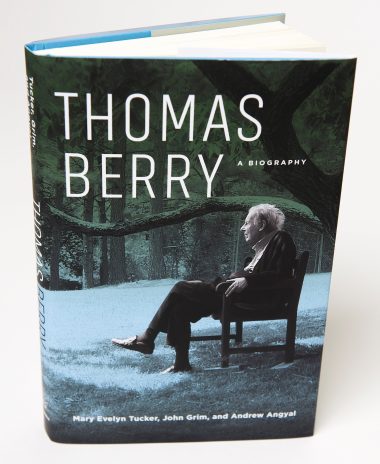Angyal, professor emeritus of English and environmental studies, co-authored the biography of Berry, a Catholic priest and cultural historian who focused his scholarship on the evolution of the universe and humanity’s place within it.
Professor Emeritus of English and Environmental Studies Andy Angyal had long been an admirer of Thomas Berry, the noted scholar and thinker, when Berry retired to Greensboro, N.C. in 1995. It was in Greensboro, the city where Berry had been born in 1914, that Angyal would connect with the Catholic priest, cultural historian and “ecotheologian,” and the work on the recently published “Thomas Berry: A Biography,” would begin.

“What interested me about Thomas in particular was that he had an environmental awareness, but it was much larger and more comprehensive than anyone else I had come across,” Angyal said. “He had much more of a spiritual perspective.”
Angyal spent 35 years at Elon, retiring from the university in 2011 after a career that including heading the theater department and creating what would grow to become the Department of Environmental Studies. He has a longstanding interest in environmental issues, having worked for the Environmental Protection Agency while working toward a doctorate in American literature at Duke University. His interest in Berry was sparked by his 1988 book, “The Dream of Earth.”
Berry’s return to Greensboro offered Angyal the opportunity to build a lasting connection with the scholar, and to plant the seeds that would grow into the biography. Angyal met regularly with Berry, often once a week for breakfast, to discuss the man’s life and scholarship, working directly with him on the biography for the decade leading up to his death in 2009.
After having difficulty finding a publisher, Angyal turned toward a collaboration with Tucker and Grim, a husband and wife who teach at the Yale School of Forestry and Environmental Studies and at the Yale Divinity School, where they direct the Yale Forum on Religion and Ecology. The couple worked closely with Berry as his students, editors and literary executors, and serve as managing trustees of the Thomas Berry Foundation.

Angyal’s focus for the biography was on Berry’s early life. One of 13 children, Berry left Greensboro and entered a monastery of the Passionist order in 1933, and was ordained in 1942. After earning a doctorate from The Catholic University of America, his interest in China and Chinese culture took him to that country in the late 1940s.
He studied and taught at Beijing’s Fu Jen University and returned to the U.S. in 1949 after Mao Tse-tung took over China. He became a chaplain in the U.S. Army, hoping for a post in Japan, but instead was stationed in Germany, concluding his service in 1954.
Afterwards Berry undertook a teaching career, first with the Asian Institute of Seton Hall University, then with the Asian Institute of St. John's University and finally, at Fordham University, where he instituted the doctoral program in the history of religions. “It was his world religious interests that led him to an environmental awareness,” Angyal said. “His environmental awareness was cosmic, in a sense. … His life curve is a very unusual one.”
Newsweek magazine described him in 1989 as “the most provocative figure among the new breed of eco-theologians.” As noted in the new biography, “Berry urged humans to recognize their place on a planet with complex ecosystems in a vast, evolving universe. He sought to replace the modern alienation from nature with a sense of intimacy and responsibility.”
Besides the 11-volume "Riverdale Papers" and treatises on "Buddhism" (1966) and "The Religions of India" (1971), the most influential of Berry's books are "The Dream of the Earth" (1988, National Lannan Non-Fiction Award 1992); "The Universe Story: From the Primordial Flaring Forth to the Ecozoic Era" (1992) (with mathematical-cosmologist Brian Swimme); "The Great Work: Our Way Into the Future" (1999); and "Evening Thoughts: Reflecting on Earth as Sacred Community" (2006). In 2008, Berry received an honorary doctorate from Elon University stemming in part from his long mentoring relationship with Angyal.
Angyal notes that Berry’s insights and perspectives are even more important today as the world deal with climate change and other environmental challenges. “I see this as a type of environmental guide that this planet is going to need if we are going to make it through the next 100 years,” Angyal said.


